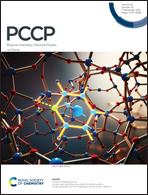First-passage times in protein folding: exploring the native-like states vs. overcoming the free energy barrier†
Abstract
Using a model β-hairpin protein as a representative example of simple two-state folders whose kinetics are uncomplicated by the presence of on- and off-pathway intermediates, it is studied how the search for the protein's native state among native-like states affects the folding kinetics. It is revealed that the first-passage time (FPT) distributions are essentially single-exponential not only for the times to overcome the free energy barrier between the unfolded and native-like states but also for the times to find the native state among the native-like ones. The FPT distributions of this type are observed through all studied two-state-like regimes of protein folding, varying from a regime close to two-state folding to a regime close to downhill folding. If the protein explores native-like states for a time much longer than the time to overcome the free energy barrier, which is characteristic of high temperatures, the resulting FPT distribution to reach the native state remains close to exponential but the mean FPT (MFPT) is determined not by the height of the free energy barrier but by the time to explore native-like states. In particular, the mean time to overcome the free energy barrier is in reasonable agreement with the Kramers rate formula and generally far shorter than the overall MFPT to reach the native state. The observed increase of the overall MFPT, as a result of longer exploration of native-like states, may lead to an overestimate of the height of the free energy barrier between the unfolded and folded states when it is calculated from the overall MFPT.



 Please wait while we load your content...
Please wait while we load your content...